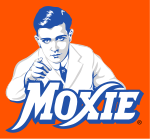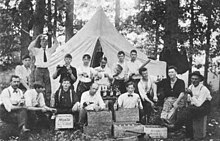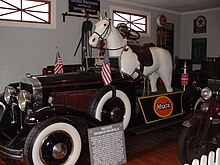| Revision as of 10:30, 28 February 2022 editRidwan97 (talk | contribs)Extended confirmed users22,443 edits →topTags: Mobile edit Mobile app edit Android app edit← Previous edit | Revision as of 02:53, 8 March 2022 edit undoCitation bot (talk | contribs)Bots5,413,536 edits Alter: date. | Use this bot. Report bugs. | Suggested by Whoop whoop pull up | Category:Carbonated drinks | #UCB_Category 2/50Next edit → | ||
| Line 95: | Line 95: | ||
| =="Moxie" as a slang term== | =="Moxie" as a slang term== | ||
| Moxie was early advertised as "nerve food" which would "strengthen the nervous system" and was "very healthful" and a "drink for athletes" which "strengthens and invigorates". The term "moxie", which derives from the drink name, has the approximate meaning of ""energy, determination, spunk, daring courage, nerve, spirit, guts". This term was extant from about the 1930s and has continued in use, to some extent, into the early 21st century, <ref>{{cite web |url=https://uselessetymology.com/2018/02/10/etymology-of-moxie/ |title=The Etymology of 'Moxie' |author=Jess Zafarris |date= |work=Useless Etymology |accessdate=February 17, 2022}}{{cite web |url=https://www.merriam-webster.com/dictionary/moxie |title=Definition of ''moxie'' |work=Merriam-Webster online dictionary |accessdate=February 17, 2022}}{{cite web |url=https://www.collinsdictionary.com/us/dictionary/english/moxie |title=moxie in American English |work=Collins Dictionary |accessdate=February 17, 2022}}The Chambers Dictionary, 1993, {{ISBN|0-550-10255-8}}</ref> as in "This kid's got moxie!" | Moxie was early advertised as "nerve food" which would "strengthen the nervous system" and was "very healthful" and a "drink for athletes" which "strengthens and invigorates". The term "moxie", which derives from the drink name, has the approximate meaning of ""energy, determination, spunk, daring courage, nerve, spirit, guts". This term was extant from about the 1930s and has continued in use, to some extent, into the early 21st century, <ref>{{cite web |url=https://uselessetymology.com/2018/02/10/etymology-of-moxie/ |title=The Etymology of 'Moxie' |author=Jess Zafarris |date= February 10, 2018|work=Useless Etymology |accessdate=February 17, 2022}}{{cite web |url=https://www.merriam-webster.com/dictionary/moxie |title=Definition of ''moxie'' |work=Merriam-Webster online dictionary |accessdate=February 17, 2022}}{{cite web |url=https://www.collinsdictionary.com/us/dictionary/english/moxie |title=moxie in American English |work=Collins Dictionary |accessdate=February 17, 2022}}The Chambers Dictionary, 1993, {{ISBN|0-550-10255-8}}</ref> as in "This kid's got moxie!" | ||
| ==See also== | ==See also== | ||
Revision as of 02:53, 8 March 2022
Carbonated beverage For other uses, see Moxie (disambiguation).| A request that this article title be changed to Moxie (soft drink) is under discussion. Please do not move this article until the discussion is closed. |
 | |
 | |
| Manufacturer | The Coca-Cola Company |
|---|---|
| Country of origin | United States |
| Region of origin | Maine, New England |
| Introduced | 1876; 148 years ago (1876) |
| Discontinued | Moxie Cherry Cola, Moxie Cream Soda, Moxie Orange Cream, Ted's Root Beer |
| Color | Caramel |
| Variants | Diet Moxie, Moxie Energy, Moxie Energy Citrus, Moxie Energy Explosion, Moxie Energy Thunder, Olde New England Seltzer, Moxie Blue Cream |
| Website | drinkmoxie |
Moxie is a brand of carbonated beverage that is among the first mass-produced soft drinks in the United States. It was created around 1876 by Augustin Thompson (born in Union, Maine) as a patent medicine called "Moxie Nerve Food" and was produced in Lowell, Massachusetts. The sweet soda is similar to root beer, with a bitter aftertaste. It is flavoured with gentian root extract, an extremely bitter substance commonly used in herbal medicine.
Moxie was designated the official soft drink of Maine on May 10, 2005. It continues to be regionally popular today, particularly in New England states. It was previously produced by the Moxie Beverage Company of Bedford, New Hampshire until Moxie was purchased by The Coca-Cola Company in 2018.
The name has become the word "moxie" in American English, a noun meaning energy, determination, and spunk.
History
Moxie originated around 1876 as a patent medicine called "Moxie Nerve Food," by Augustin Thompson in Lowell, Massachusetts. Thompson claimed that it contained an extract from a rare, unnamed South American plant, which is now known to be gentian root. Moxie, he claimed, was especially effective against "paralysis, softening of the brain, nervousness, and insomnia."
Thompson claimed that he named the beverage after a Lieutenant Moxie, a purported friend of his, who he claimed had discovered the plant and used it as a panacea, and the company he created continued to promulgate legendary stories about the word's origin. It likely derives from an Abenaki word that means "dark water" and that is found in lake and river names in Maine, where Thompson was born and raised.
After a few years, Thompson added soda water to the formula and changed the product's name to "Beverage Moxie Nerve Food." By 1884 he was selling Moxie both in bottles and in bulk as a soda fountain syrup. In 1885, he received a trademark for the term. He marketed it as "a delicious blend of bitter and sweet, a drink to satisfy everyone's taste." Thompson died in 1903.

In 1907, the Moxie Nerve Food Company of New England filed a lawsuit in Boston against the Modox Company and others, alleging that they had copied the ingredients of Moxie and were using the name "Modox," which closely resembles "Moxie," and were infringing upon patents and trademarks. The suit was dismissed by the judge, who said the court could not protect the legitimate part of the plaintiff's business in this case. In a later case in New York, the Moxie Nerve Food Company won a lawsuit against Modox, which subsequently went out of business.
President Calvin Coolidge was known to favor the drink, and Boston Red Sox slugger Ted Williams endorsed it on radio and in print. The company also marketed a beverage called "Ted's Root Beer" in the early sixties. Author E. B. White once claimed that "Moxie contains gentian root, which is the path to the good life."
The brand suffered a significant decline in sales during the 1930s.
The Catawissa Bottling Company in Catawissa, Pennsylvania is one of six bottlers in the United States that produce Moxie. Catawissa has produced it since 1945. Polar Beverages also bottles Moxie in Worcester, Massachusetts, as does Orca Beverage in Mukilteo, Washington.
Since 1962
Sugar-free Diet Moxie was introduced in 1962, about the same time that Mad magazine began placing the Moxie logo in the background of its articles to increase public awareness of it. As a result of Mad's efforts, sales of the soft drink increased 10% which led to the "Mad About Moxie" campaign.
The Moxie brand was purchased in 1966 by the Monarch Beverage Company of Atlanta. In 2007 Monarch sold it to its previous owner, Cornucopia Beverages of Bedford, New Hampshire, which is owned by the Coca-Cola Bottling Company of Northern New England, a subsidiary of the Kirin Brewery Company, which is a subsidiary of Kirin Company, Limited, which is a subsidiary of Kirin Holdings Company, Limited, based in Tokyo, Japan (a member of the Mitsubishi keiretsu).
In its decision to step up efforts to distribute the product, Cornucopia cited increasing requests for Moxie from fans across the country. In 2007 it launched pilot sales in Florida and in 2010 granted distribution in Florida to Florida Micro Beverage Distributors.

In 2011, Cornucopia began doing business as the Moxie Beverage Company to market Moxie and Moxie-branded products. A website, DrinkMoxie.com, was created to promote Moxie. Drink recipes using Moxie were created.
Demand for Moxie has waned in recent years, although the brand persists in New England and Pennsylvania.
On August 28, 2018, the Coca-Cola Company announced its purchase of Moxie from Coca-Cola Bottling Company of Northern New England Inc. for an unspecified amount.
Advertising

Moxie advertising in the 19th and early 20th centuries emphasized Moxie as a health drink and "nerve food".
In its advertising, Moxie used "Make Mine Moxie!" jingles, the slogan "Just Make It Moxie for Mine," and a "Moxie Man" logo. The Moxie Man has appeared on labels in some form since 1906, and the image of a man pointing forward most associated with the brand was first introduced in 1911. The identity of the "Moxie Man," or "Moxie Boy" as he was called in the 1920s, was apparently not known at that time, with a 1922 ad in the Boston Herald by F. M. Archer proclaiming "in almost every town and city in the United States there is someone who believes they know the original of the Moxie Boy. In view of the many thousands of different opinions on this subject, we may offer a prize to the person who picks the actual boy, furnishing us photographic proofs, etc...the Moxie Boy, now a man (and some man at that), who posed for this picture many, many years ago, in fact before some of the readers of this article were born." For many years the urban legend was that Archer himself was Moxie's mascot, but he would have been about 50 at its introduction in 1911, disproving this theory. In recent years a historical group, The Moxie Congress, was able to ascertain that the man was likely a model for the lithographers printing these advertisements, and with some confidence it is posited that the "Moxie Boy" was one John T. Chamberlain of Revere, Massachusetts. In 2010 the Moxie Man logo was removed from labels for a brief period because it was thought to be too old-fashioned. In 2011 the company's head of marketing, Ryan Savage, made the executive decision to bring the logo back in response to complaints from long-standing customers.
A unique advertising tool was the Moxie Horsemobile, a modified automobile whose driver sits on a large model of a horse. The first Horsemobiles were deployed around 1918. A 1935 Rolls-Royce Moxie Horsemobile was sold for $55,000 at the May 20, 2011, Mecum Auction in Indianapolis, Indiana. Moxie at one time maintained about two dozen of them, and they appeared in parades and other public functions.
Derivative products
There is a Moxie Energy Drink and a variety of Olde New England Seltzers. The energy drink is citrus-based; it lacks Moxie's gentian root tang, caramel color, and (as of 2008) its distinctive branding; similarly, the waters are simply carbonated waters with fruit flavors marketed under the Moxie brand.
Moxie ice cream is seasonally available in Maine in limited quantities and is mild in flavor as compared to the soft drink.
Moxie has been used as a cooking additive by chefs for its herbaceous, savory-sweet flavor profile. It is generally used in reductions as a glaze for meats such as lamb, as well as in baked beans.
"Moxie" as a slang term
Moxie was early advertised as "nerve food" which would "strengthen the nervous system" and was "very healthful" and a "drink for athletes" which "strengthens and invigorates". The term "moxie", which derives from the drink name, has the approximate meaning of ""energy, determination, spunk, daring courage, nerve, spirit, guts". This term was extant from about the 1930s and has continued in use, to some extent, into the early 21st century, as in "This kid's got moxie!"
See also
References
- "Moxie - Official Site: Privacy Policy". Moxie Beverage Company. June 23, 2011.
- ^ Mark Pendergrast: For God, Country and Coca-Cola, Charles Scribner's Sons, New York, 1993, ISBN 978-0-465-05468-8
- ^ "Moxie". Silver Internet Ventures, LLC. Archived from the original on June 5, 2010.
- Waugh, Danielle (August 29, 2018). "Maine Split on Coca-Cola's Acquisition of Moxie". NBC10 Boston. Retrieved January 26, 2019.
- Office of the Revisor of Statutes (2005). "Title 1, Section 224 of General Provisions: Seal, Motto, Emblems and Flags". State House of Maine. Retrieved December 7, 2014.
- Whittle, Patrick (August 28, 2018). "Coca-Cola acquires Moxie, a soda brand that is beloved in Maine". USA Today. Retrieved January 26, 2019.
- Moffat, Anne Riley (August 28, 2018). "Coke Inks Deal to Buy Moxie, the Official Soft Drink of Maine". Bloomberg.
- "Moxie. Distinctively Different". Drinkmoxie.com. Retrieved February 12, 2018.
- "Moxie For Mine: More About Moxie the Drink". Bdragon.com. Retrieved February 12, 2018.
- Perry, John F. "Echoes," Tobie(ed.), The Maine Bugle, January 1, 1897, Campaign IV, Call 1, p.85
Thompson served in and eventually commanded Company G, of 28th Maine Volunteer Infantry Regiment during the Civil War. - "moxie (n.)". Online Etymology Dictionary. 2014. Douglas Harper. September 3, 2014, http://www.etymonline.com/index.php?term=moxie.
- Anne Cooper Funderburg (2001), Sundae best: a history of soda fountains, Popular Press, pp. 67–68, ISBN 978-0-87972-854-0
- Doctor Augustin Thompson. Matthews Museum of Maine Heritage. Published 2008. Retrieved May 8, 2010. Archived February 8, 2012, at the Wayback Machine
- ^ "Commercial Site: Modox".
- "Moxie Nerve Food Company of New England v. Modox Co. et al. : Circuit Court, District of Rhode Island, February 20, 1907", The Federal Reporter, v.151-152, 1907, pp.493-509.
- written at Harvard-Radcliffe, "Make Mine Moxie", Perspective, Cambridge, Massachusetts, November 2001, archived from the original on November 15, 2004, retrieved October 9, 2007
- Abelson, Jenn (August 5, 2007), "Can a bitter taste find sweet life again? Unique N.E. soda Moxie thirsting for a revival", The Boston Globe, retrieved August 15, 2007
- Polar Bev Partner Products, retrieved August 18, 2011
- Moxie – 12 Pack – Orca Beverage Inc., February 19, 2016, retrieved March 6, 2016
- "History of Moxie: 1960 - 1969". Moxie Beverage Company. n.d.
- Dun's Review. Dun and Bradstreet. January 1968. p. 56.
- Paiste, Denis (April 6, 2007). "Moxie, same taste, new owner" (reprint). New Hampshire Union Leader. Union Leader Corporation. p. B3. Retrieved November 25, 2007.
- "Florida is getting some Moxie", AP via boston.com, December 8, 2010. Retrieved December 8, 2010.
- "Coke Inks Deal to Buy Moxie, the Official Soft Drink of Maine". Bloomberg.com. August 28, 2018.
- Archer, F. M. (November 12, 1922). "Drink Moxie, If at All Particular [Advertisement]". Boston Herald. Boston. p. 68 – via GenealogyBank.
- ^ Leheney, John. "The Moxie Boy Mystery". The Moxie Congress. Archived from the original on January 18, 2019.
- "The Removal of The Moxie Man and his Return". History of Moxie. Retrieved April 16, 2015.
- Wagner, Debra (July 7, 2010). "Moxie Ice Cream "You 'Betcha' It's Wicked Good"". The Lisbon Reporter. Retrieved October 13, 2013.
- Pelletier, Jenna (August 31, 2018). "Why Chefs Love Moxie, New England's Cult-Favorite Soda; Moxie glazed lamb belly, anyone?". Food & Wine. Aspen, CO. Archived from the original on October 24, 2019.
- "Cooking with Moxie: Unusual recipes abound during festival celebrating drink". Bangor Daily News. June 17, 2011. Archived from the original on March 28, 2018.
- Jennings, Matt. "Braised Short Ribs & Moxie Beans". The Splendid Table. Archived from the original on October 24, 2019.
- Jess Zafarris (February 10, 2018). "The Etymology of 'Moxie'". Useless Etymology. Retrieved February 17, 2022."Definition of moxie". Merriam-Webster online dictionary. Retrieved February 17, 2022."moxie in American English". Collins Dictionary. Retrieved February 17, 2022.The Chambers Dictionary, 1993, ISBN 0-550-10255-8
Further reading
- Bowers, Q. David, The Moxie Encyclopedia, Vestal Press, 1985. ISBN 978-0-911572-43-8
- Grace, Roger M., "Is Hires the Longest Marketed Soft Drink? Or Moxie? Or...?", Metropolitan News-Enterprise newspaper, Los Angeles, Thursday, November 17, 2005, p. 15
- "History of the Greatest Modern Temperance Beverage". The National Magazine. Vol. VI, no. 3. Boston: The W. W. Potter Company. June 1897. p. 288.
- Potter, Frank N., The Book Of Moxie, Paducah, KY : Collector Books, 1987. ISBN 0-89145-348-2.
- Tobie, Edward Parsons, Jr., ed. (January 1, 1897). "Echoes" (PDF). The Maine Bugle. IV (1). Rockland, ME: The Maine Association.: 85. OCLC 297363634. Retrieved February 28, 2020.
{{cite journal}}: CS1 maint: multiple names: editors list (link)
External links
- Official Website
- Moxie facts
- "Make Mine a Moxie!" – Maine Farmhouse Journal, July 6–10, 2000
- https://www.bostonglobe.com/business/2018/08/28/coca-cola-acquires-beloved-maine-soda-moxie/8EWByZiHnZwIp1qT4ik45M/story.html
| Monarch Beverages | |
|---|---|
| Current brands |
|
| Former brands |
|
- Maine culture
- Food and drink companies established in 1876
- 1876 introductions
- Kirin Group
- Mitsubishi companies
- Monarch brands
- Patent medicines
- Carbonated drinks
- Coca-Cola acquisitions
- 1876 establishments in Massachusetts
- Drink companies of the United States
- Food and drink companies based in Maine
- Food and drink companies based in Massachusetts